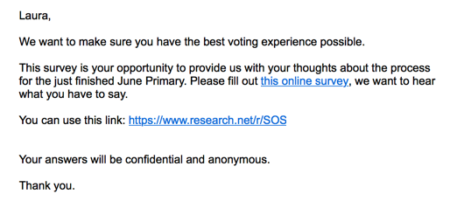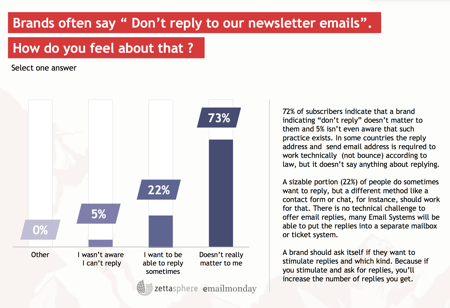Send Actual SMTP
- laura
- November 19, 2018
- Best practices
It’s rare I find mail that violates the SMTP spec (rfc5321 and rfc5322). I’ve even considered removing “send mail from a correctly configured mail server” from my standard Best Practices litany.
But today I got mail asking me to respond to a survey.
This whole email is a mess of problems, and it’s claiming to be from the California Secretary of State. It’s also discussing the June Primary, which isn’t the election we just had. The from address doesn’t reassure me, they’re claiming to be: VotersChoice.SoS.Ca.Gov@mailservices6.com. The mail is being sent to the address I gave California when I registered as an overseas voter, but those lists are public.
In the course of trying to decide if this was real or was just some way to steal private information, I discovered this particular mail server isn’t actually sending real SMTP.
X-Amavis-Alert: BAD HEADER SECTION, Non-encoded non-ASCII data (and not UTF-8) (char 9C hex): Received: \x{9C}by v1.mailserviNow, quite honestly, I suspect this is actually legitimate mail. A few google searches and I discover mailservices6.com belongs to California Survey Research Services, Inc. They manage data collection for a lot of different government agencies. Looking at information around them this is exactly the kind of vendor that I expect a government agency to use.
I have to wonder, though, how well their email surveys actually perform. They’re not sending actual SMTP. The non-ASCII character is in their own internal handoff to a server running an obsolete version of Sendmail. While our mail server is somewhat forgiving of non-SMTP mail not all mail servers are. Even if that isn’t enough to tank their delivery, there are multiple similar but not identical domain names in the body of the message. The link to ‘research.net’ doesn’t actually go to research.net, it points to yet another random domain name. Put all this together with the unsolicited nature of the email I’d be amazed if any of their mail was reaching the inbox at the consumer ISPs.
Looks like I’ll be keeping the “and make sure you send SMTP” in the list of recommendations, because there are still groups out there who are not sending valid SMTP. If my mail is to be believed, some of them are being paid by the state of California to do so.

